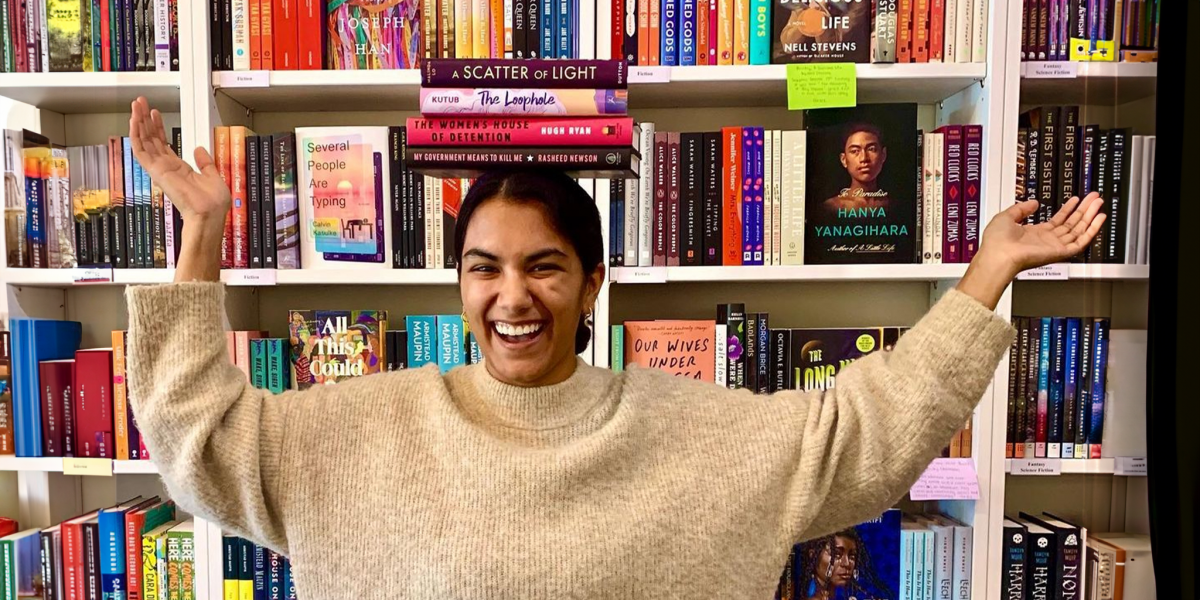A look into the experience of an MLIS student’s library internship

Grace Burke, MLIS Student at the UMD INFO College
The roles of librarians within educational institutions is continually evolving. With this shifting landscape comes the need for highly skilled and adaptive professionals in the field. The library field study program at the Universtiy of Maryland College of Information Studies (INFO) is an opportunity for Master of Library and Information Science (MLIS) students like Grace Burke who are opting for a school libraries focus—a specific track for students who want to work in a school library or media center in a K-12 setting—to become that type of professional.
Deal Middle School
Grace Burke’s first internship was at Deal Middle School in Washington, DC. They started it with a clear mission to immerse themselves in the environment. Their objective was simple—to become intimately familiar with the space and contribute to its evolution. The librarian, new to the role since the academic year’s start, had aspirations to make the library more navigable and inviting but had not yet imprinted this vision on the space. He entrusted Burke to revamp the library signage to enhance student independence and accessibility. Their efforts were not just about improving the aesthetics but about empowering students to explore the library’s resources confidently.
Burke also found themselves teaching students. The routine was established; a selected teacher’s classes would come in, and Burke, alongside the librarian, would teach each group back-to-back. The primary goal was to remind students how to navigate the library’s offerings efficiently.
Brent Elementary School
Burke’s next internship was at Brent Elementary School, another DC public school. The organization of the library catered to its young learners. While the Dewey Decimal system and alphabetical sorting were used for non-fiction and fiction sections respectively, the librarian also employed a bin system to help students peruse the collection more effectively.
Burke was tasked with creating bins for the biography section—something that hadn’t been done yet. At first, they created separate bins for astronomers and astronauts. However, the librarian suggested using the universally appealing theme of “space” to capture the children’s imagination and interest.
“And so I think one of the challenges that I’ve learned, and I’m really excited that I’ve learned, is so much of the work is just putting yourself in the shoes of a 3- and 4-year-old and recognizing what pictures excite them,” says Burke. “So in addition to saying ‘space,’ there’s a picture of planets and a rocket ship. So what is interesting to them? What is going to translate to them?”
Burke’s favorite interactions were with the upper school when she led fourth and fifth graders in a makerspace activity. They did an “unmaking project,” starting with something as simple as a pen. Students first considered the internal components of these pens, then carefully broke them apart to further explore them.
The students moved on from pens to dissecting more complex objects—personal toys they brought from home. Finally, the students used the library’s 3D printer to design and build their own toys—an exercise in critical thinking, planning, and real-world application of their coding skills and technological understanding.
“I loved supporting them through that project,” Burke says. “They were so smart and so inquisitive, and a lot of the things that I did with them was just helping them troubleshoot. So they would have this really cool, ambitious idea. And my role was like, is that possible?”
Biggest Takeaways
Burke believes the internship program provided them with a wide range of experiences. “I love the minute detail of data management and collection weeding, working with data and numbers and figuring out all of that stuff,” they say. “And then I also really love the forward-facing aspect of teaching and working directly with kids. And so I think my biggest takeaway from this experience, especially depending on what type of school I end up in, is how much there seems to be flexibility in terms of the balance between library management and administrative tasks and the front-facing side.”
Burke also acquired important technical skills, particularly in managing library systems. They learned to use Follett Destiny, a key platform used by school libraries for various administrative tasks. This software is central to managing collections, checking in and out books, cataloging, and organizing backend library operations. Despite its widespread use, Follett Destiny is known for its lack of user-friendliness and outdated interface, making proficient use a valuable skill.
New Realizations
During their internship, Burke changed their perspective on the role of school librarians. Initially, Burke had assumed that a librarian’s primary responsibility was to cater to the students, promoting literacy and ensuring they had access to books. However, they came to realize that librarians also support educators within the school. They assist teachers by selecting appropriate books for classroom use, aiding in the integration of literature into lessons, and instructing both students and teachers on how to utilize various technological tools.
Another key insight for Burke was recognizing that school librarians are, in essence, educators. They contribute to the school in ways similar to specialized teachers in subjects like English and math, playing an integral role in the academic ecosystem.
“Libraries are and should be a class. And the teachers, the librarian, should be seen as teachers in very similar ways, I think as most of the other adults in the school building,” Burke says.
“I didn’t go to school to become a teacher, but I know I love literacy and I know I love books and I know that I love children. And so what does this realization mean in terms of what my career will look like?”
Burke graduates in May 2024.